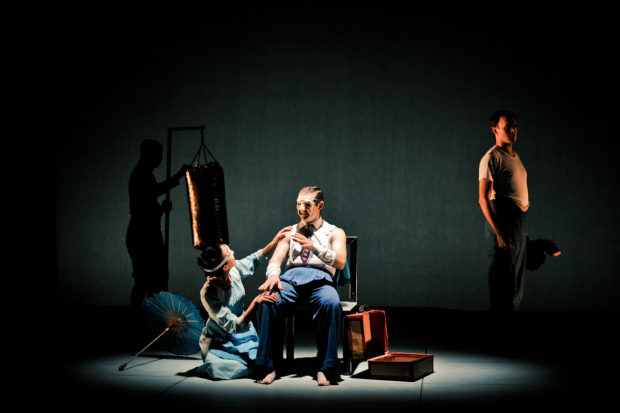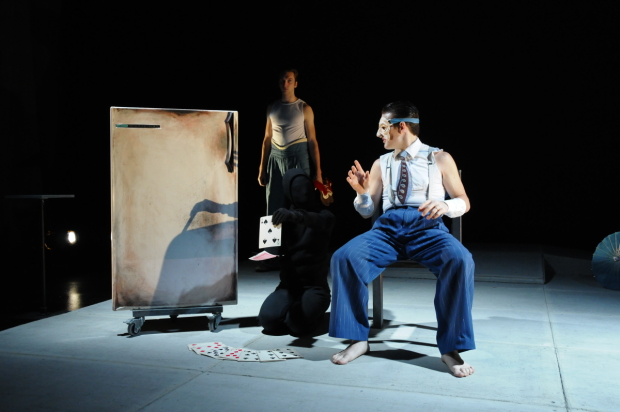Death of a Salesman

(© Theater Mitu)
The company that staged a production of Hair with 30 close-cropped performers has created a highly stylized and thrilling interpretation of Arthur Miller's masterpiece, Death of a Salesman, running at the BAM Fisher. Theater Mitu, under the direction of Rubén Polendo, approaches the work from a modernist, almost surreal point of view. Polendo and Kate Ashton's minimalist set design gives the sense of an immaculate warehouse space in which inanimate objects — each of which represent some of the play's characters — are quickly wheeled into and out of the memory of Willy Loman, the title character. Bursting with color (Ashton also designed the lighting) and featuring an original score by Ellen Reid and Ada Westfall captivatingly performed by Westfall, Theater Mitu's revival breathes new life into Salesman.
The production's hyperactivity (a little overwhelming at times) might seem like a strange way to tell the somber and desperate story of Willy Loman (Justin Nestor in a stunning performance), a 63-year-old salesman who is past his lackluster prime. His long-suffering wife, Linda (a convincingly despondent Kayla Asbell), has raised their two ne'er-do-well sons — Biff (an intense Corey Sullivan) and Happy (Denis Butkus delivering his lines with youthful optimism) — the best she could. Willy has always believed fervently in the American dream, but his failure to achieve that dream leads him to self-doubt, self-delusion, and despair.

(© Theater Mitu)
Much of his time is spent in memories and fantasies of a past that never existed — of being a well-liked and successful salesman, of raising two promising sons, of being a good husband. (In several of these episodes, Nestor sings Willy's lines with aching pathos.) Biff returns home to New York after wasting away on the West Coast, and Willy is filled with hope that his son will finally find himself and make good. But when the family's lies are laid bare during an altercation, Willy's fantasies about his life shatter and make going on seem impossible for him.
Polendo and Theater Mitu's nontraditional approach to the material, despite being initially disorienting, suits Miller's memory play and captures the essence of his stage direction for the Loman home: "An air of the dream clings to the place, a dream rising out of reality." At first, it's not certain what to make of the actor clad entirely in black who wheels in a punching bag and then begins speaking Happy's lines. It takes a minute to realize that the punching bag is Happy. Other characters are also represented in this way with objects that Willy associates with them: A refrigerator door is his likable neighbor Charley; an oscillating fan is his chatty mistress; a photographer's bright ring lamp is his successful brother, Ben. Substituting these things for people contributes to the production's dreamlike feel.
Other theatrical devices have the effect of extending the scope of the play beyond its American setting. Masks (designed by Lori Petermann), used to indicate Willy and Linda in the present, recall ancient Greek tragedies, and Linda's parasol is reminiscent of Kabuki theater. These props help create a Salesman that reaches for the universal in its description of the human condition.
Candida K. Nichols's costumes, too, contribute to this world-embracing motif. Willy wears blue pinstripes that evoke American fashion of the 1940s, but his bare feet and bare arms (revealed by a cut-off shirt) suggest the exotic. Willy, in effect, becomes not just a typical American salesman, but an everyman.
To reveal more here would spoil the surprises best discovered by audiences on their own. Purists who prefer a straightforward Salesman may balk at Theater Mitu's take. This production, however, performed at a time when our country is taking a hard look at its own delusions, gives Miller's words a modern resonance. "Attention must be paid," says Linda, wearing a mask, about her hardworking husband. As we scrutinize the myth of the American dream, that's a message many of us are just waking up to.











